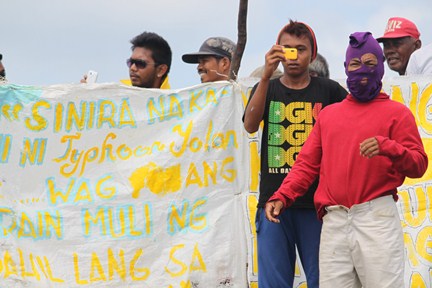By ELLEN T. TORDESILLAS
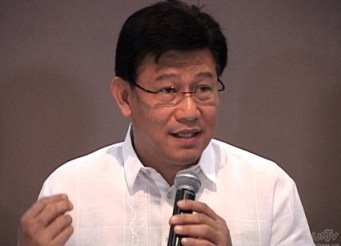
HAS the government relinquished its duty of regulating the mining industry to the Catholic Church?
That’s the question I asked Environment Secretary Ramon Paje when he said that Hinatuan Mining Corporation (HMC) has to get the approval of the church to their request to remove the 1.1 million metric tons nickel ore stockpile in Manicani which poses risk to the environment minerals pose this rainy season.
Way back 2003 (the Environment secretary then was Heherson Alvarez), the Mines and Geoscience Bureau and Environmental Management Bureau of the Department of Environment and Natural Resources investigated and evaluated the impacts of mining operations in Manicani and Homonhon islands in Guiuan, Eastern Samar and the recommendation on the stockpile was, “while the operations of Hinatuan remains suspended, all available ore materials stockpiled form shipment must be disposed of immediately as these materials may cause siltation and water pollution along the seashore subject, however, to compliance with the other requirements of the DENR, MGB and EMB, as well as with the pertinent laws, rules and regulations.”
Does the Catholic Church have the veto power on decisions and recommendations by the DENR?
Paje clarified that it’s not that they have relinquished their job to the church but it would be good for everyone especially to the mining company to have the cooperation of the community including the Church.
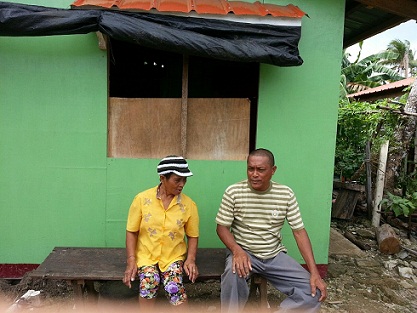
Majority of the community, according to a joint resolution by the officials Manicani’s four barangays (Buenavista, Hamorawon, San Jose and Banaag) are for the disposal of the stockpile.
“With authoritative basis (survey results vis-à-vis those who like the disposal of the stockpiles and to those who don’t like) let it be set for record purposes in this joint resolution that all throughout the island of Manicani there are 87% of the constituents who ardently desire to have the stockpiles removed by Hinatuan Mining Corporation and 13 % don’t want that the same be removed,” the barangay officials said in a resolution sent to Bishop Crispin B. Varquez, bishop of the diocese of Borongan; DENR Secretary Ramon J.P. Paje; MGB Director Leo L. Jasareno; Regional Director Alilo C. Ensomo, Jr. of MGB, Reg.8.
The joint resolution also cited the July 1, 2014 order of Jasareno to allow and have the loading of the nickel ore stockpile be expedited “so as this island will be free from the ‘hazards’ posed by it during the rainy days.
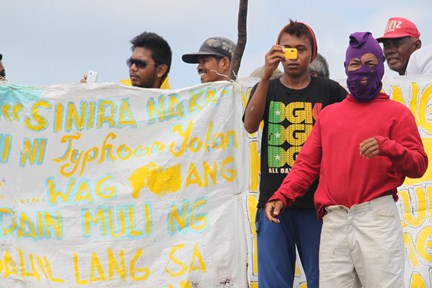
Manicani residents were lucky that when super typhoon Yolanda struck the island almost two years ago,the stockpile, which had been there since 1991, didn’t cause much harm to the island and its residents. But, Jose Bayani Baylon, vice president for Communications of Nickel Asia Corporation, HMC’s mother company, said Yolanda was mostly strong winds and not much rain. It’s a different case with the amihan.
Baylon said due to the huge volume of the stockpile which consists mostly of low-grade ore, it would take about two years to have it all transported for processing to another NAC subsidiary before it could be sold to the market. That would mean jobs for residents of Manicani.
“Sabi ko nga, we can wait until the next administration… We can wait for another year. But that would mean that the islanders would have no source of income,” Baylon said.
Baylon also stressed that what HMC is asking DENR is permission to remove the ore stockpile from the island, not to resume mining operations which was suspended in many years.
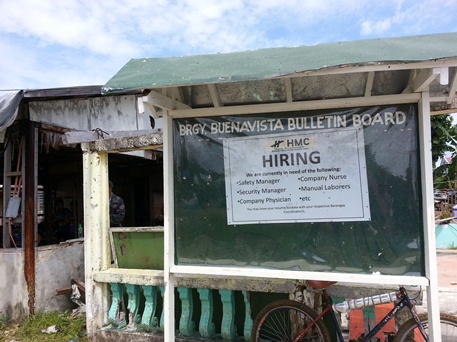
Baylon said Regional Director Alilo C. Ensomo, Jr. of MGB, Reg.8, who was earlier been instructed to “Act accordingly” on HMC’s request to remove the stockpile from the island was about to issue the permit but Paje told him to “hold it.”
There must be other reasons why Paje is withholding the permit. Using the bishop of Borongan’s opposition is a lame excuse. DENR is in a better position than the bishop to assess the real risks of that nickel ore stockpile as well as the benefits for the people of Manicani with its removal from the island.
It is right that the DENR as the regulator in the mining industry gives importance to consensus-building.
However, as articulated in the national Minerals Policy, “… in case of unreasonable/unjustifiable objections to impasse, an informed majority public acceptance and support shall be acceptable.”
